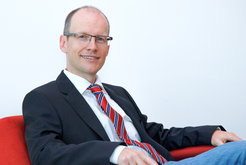Ralf Adams receives a prestigious ERC Advanced Grant
Promising prospects for osteoporosis research
The European Research Council (ERC) has honoured the outstanding research of Director Ralf Adams from the Max Planck Institute (MPI) of Molecular Biomedicine with an "ERC Advanced Grant". With the coveted five-year grant, the biochemist is investigating the role of blood vessels in the age-related loss of bone mass. Results from the funded research will form the basis for future approaches that utilise vascular cells for the prevention of bone loss and the treatment of osteoporosis.

In healthy ageing, but also in osteoporosis, which affects around a fifth of women over the age of 50 in Europe, the loss of mineralised bone is caused by an imbalance between bone formation and bone resorption. Although blood vessels are abundant in the skeletal system and play an important role, they are not currently considered in the treatment of osteoporosis.
Recent work by Ralf Adams has already provided fundamental insights into the organisation of the bone vascular system in mice: different types of small blood vessels, known as capillaries, are found in different regions of the bone. The endothelial cells, i.e. the cells of the innermost layer of the tubular blood vessels, are also regionally and functionally specialised. A certain type of capillary has largely disappeared in older animals, while other blood vessels increase with age.
With the funding from the new ERC Advanced Grant, Ralf Adams and his team aim to combine single-cell RNA sequencing with advanced immunostaining and imaging to further characterise a new subpopulation of endothelial cells in the mouse model. These capillaries are mainly found in areas of the skeletal system where bone-forming and bone-degrading cells are active. In the newly funded project, the scientists want to find out how the endothelial cells of the new capillary type control bone remodelling and how they can intervene to prevent bone loss. The researchers are particularly interested in the influence of gender and age.
Experiments in animal models are used to clarify the interaction between blood vessels and existing therapies against osteoporosis that target bone-forming osteoblasts or bone-degrading osteoclasts. These findings will later be transferred to humans using tissue samples from patients and experiments on cultured cells.
With the current funding of around 2.5 million euros from the European Research Council (ERC), Ralf Adams has been awarded the third ERC Advanced Grant in a row for his research on blood vessels in bone.
The grant is one of the most prestigious and highly competitive in the EU and offers top researchers the opportunity to pursue ambitious, curiosity-driven projects that can lead to major scientific breakthroughs.
In the current funding round, a total of 517 applications were submitted in the field of Life Sciences, of which 75 (14.5 %) were approved. Six of the life sciences grantees conduct research in the Max Planck Society.
